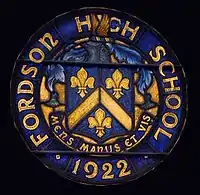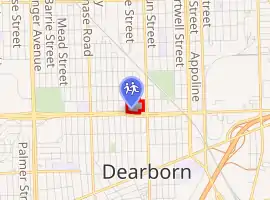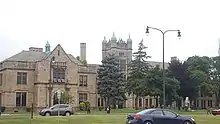Fordson High School
Fordson High School is a secondary school located in Dearborn, Michigan, United States in Greater Detroit. It was completed in 1928 on a 15-acre (61,000 m2) parcel of land which was then the village of Fordson, named for Henry Ford and his son Edsel Ford.[3] It is a part of Dearborn Public Schools.
| Fordson High School | |
|---|---|
 | |
| Address | |

| |
13800 Ford Road , 48126 United States | |
| Coordinates | 42°19′48″N 83°10′44″W |
| Information | |
| Type | Public High School |
| Established | 1922 |
| School district | Dearborn Public Schools |
| Principal | Heyam Alcodray |
| Faculty | 134.60 (FTE)[1] |
| Grades | 9-12 |
| Enrollment | 2,756 (2018–19)[1] |
| Student to teacher ratio | 20.48[1] |
| Campus | Suburban |
| Color(s) | Maize and Blue -- |
| Athletics conference | Kensington Lakes Activities Association |
| Mascot | Tractors |
| Rival | Dearborn High School Pioneers |
| Accreditation | North Central Association[2] |
| Newspaper | The Fordson Tower Tribune |
| Yearbook | Fleur de lis |
| Website | School website |
History

Prior to the opening of the school, students attended the nearby Miller School. Henry Ford contributed most of the money that was used to build the school.[4]
Ground was broken for the original school building in 1926 with representatives from each of the four entering grades participating. The senior class president was George E. Sarkozy, one of those that participated in the ceremony. The school was designed by architect Everett Lane Williams of the Detroit architectural firm Van Leyen, Schilling & Keough. The school building, designed in the Collegiate Gothic style, cost at $2.2M and was inspired in part by the buildings of the University of Michigan Law School in Ann Arbor, Michigan as well as the Rushton and Apethore halls in Northamptonshire, England.
The exterior of Fordson is made of granite and uses Briar Hill sandstone trim. The library has hand carved oak paneling, a fireplace, painted wall murals by Zoltan Sepeshy, tapestries and Jacobean fumed-oak furnishings and many bronze and marble statues including, Athena, Apollo, Artemis, Nike, Niobe, Venus, and Mercury. The main entrance has ten busts that include philosophers, playwrights, and mathematicians like Plato, Aristedes, Sophocles, Homer, Demosthenes, Aesculapius, Euripides, Pindar, Archimedes, and Socrates. The main hall also includes a blue and gold Fordson Tractor with lettering of state champions imprinted on its top. The building features architectural sculpture by Corrado Parducci. Fordson's architecture was represented in the 1987 film, The Rosary Murders when the library and tower were displayed. The school also became recognized as a Michigan Historical Site in 1998.
Fordson Tower
The Tower was constructed in 1926 and has been used for innumerable things. During World War II, the Tower was used to spot enemy aircraft that could have been headed for the River Rouge Plant, where tanks were in production. The media center used the Tower for archival storage, classes, and media center office space. Students of Fordson hung signs over the Tower including a "for sale" sign in the 1950s and the most recent in 1993 exclaiming Fordson's State Championship in football.
Renovations and additions
In 2005, an addition was adjoined to the northwestern body of the school. A cafeteria, ten classrooms including science and computer labs, and the replacement of the greenhouse comprised the new wing. The addition preserved the structure and appearance of the school by using the alternating dark and light limestone scheme and proceeding with the same architectural model developed from the school's inception. Consequently, Fordson received the Governor's Award for Historic Preservation and has been featured in many publications including the Masonry Institute of Michigan and the architects of the addition, TMP architecture.
In 2007, the athletic facilities underwent an extensive renovation. The natural turf varsity football field and the practice field on the eastern side of the athletic campus were replaced by AstroTurf surfaces. The track and tennis courts were also renovated. Beyond the tennis courts on the northern side of the campus, trees were planted when a seldom used sidewalk was demolished. Sarkozy field, the prior soccer field for the school was sold to the city of Dearborn for $800,000. The total cost before the sale was $1.6 million.
Present day
In 2009 the Wayne County Regional Education Service Agency issued a report strongly asking Fordson High's administration to only use Arabic when absolutely necessary to communicate to students and parents.[5]
As of 2013, the principal of Fordson is Youssef Mosallam, who was a graduate of the Fordson Class of 1994 and senior on the 1993 Class AA State Football Championship team. Fordson is located in Dearborn, the largest Arab community outside the Middle East, where more than 40% of the residents are of Arab ancestry. This is reflected at Fordson, where approximately, as of 2006, 95%[6] of the 2,700 student body is of Arab ancestry. According to SchoolMatters, in 2006, 91.6% of students passed the Michigan reading test while 80.4% passed the math portion. Of the students taking the ACT, the average score was 19.7 out of a possible 36.[7] According to the 2015 Mackinac Center Report, Fordson High School was ranked the 13th Best Non-Charter Public High School in the State of Michigan due to gains over the last five years of all subgroups.
In 2011 North Shore Films produced Fordson- Faith, Fasting, Football and the American Dream, highlighting the Fordson football tradition and its deep roots within the Dearborn community.
Campus

The 1928 swimming pool uses Pewabic Pottery tile and formerly had a skylight. It houses swim team and physical education swimming classes.[8]
Traditions
Fordson has many traditions within its history. Every class that graduates from Fordson provides the school with a gift. The class of 1956 presented seventy-six flags representing members of the United Nations of that year. The flags have been used at every graduation since then with many other flags being donated over the years. Football has a strong tradition within the school and the helmet is a basic element of this example. The helmet at Fordson comprises yellow with two blue stripes over the top for the varsity team, one for the junior varsity team and zero for the freshman team. Also tradition, the stripes are made with electrical tape.
Winthrop Trip
Every spring since 1991, a few Fordson juniors and seniors have had the opportunity to travel by train across the country to Winthrop, Washington. They visit Liberty Bell Junior-Senior High School and teach the local elementary students about the history and politics of Michigan.[9]
Student body
When Fordson first opened, about all of the students were European American.[4] For much of its history the students were immigrants of Greek, Italian, and Polish heritage.[10] As of 2002 students of Arab ancestry made up over 90% of the student body,[11] and as of 2012 Muslims made up about 97% of the students.[12]
In the 2000s, those of Lebanese Shia ancestry made up the largest group of Arab students.[13] Among the Arab students were longtime residents as well as recent immigrants; as of 2002 the latter often ate lunch inside the student cafeteria. Longtime residents, who often ate lunch in off-campus restaurants, thought the recent immigrants,[11] known as "boaters" meaning "fresh off the boat" in area Arab-American slang,[14] had a lack of sophistication. In the words of Gary David and Kenneth K. Ayouby, authors of "Being Arab and Becoming Americanized: Forms of Mediated Assimilation in Metropolitan Detroit," the longtimers perceived the recent immigrants as being "nerdy".[11]
To accommodate religious Muslims, the cafeteria offers halal food.[10] In 2003 52 of 53 members of the football team were Muslim while the coach was Catholic, and players used Arabic on the field to issue commands. Around that period some Muslim players active during the Islamic month of Ramadan chose to break their fasts, which they would normally observe, in order to play in the games.[15] By 2010 coach Fouad Zaban began holding football practice at night in order to make it easier for devout Muslims to participate during Ramadan.[16] Zaban had received approval to do so from Fordson and DPS administrators as well as the Dearborn police department and area residents.[17] In a 30 year period prior to that time, Ramadan had not coincided with the beginning of football season.[18]
The film Fordson: Faith, Fasting, Football documented the Muslim football players at Dearborn High; a 2003 USA Today article inspired a British Indian Muslim, Rashid Ghazi to produce and direct the film.[12]
Academic performance
As of 2016, according to Brian Stone of the Huffington Post, Fordson was "consistently praised" because larger than average numbers of its students, many of whom were from low socioeconomic backgrounds, matriculated to elite universities such as Harvard and Yale.[19]
Athletics
Fordson is a member of the Kensington Lakes Activities Association.[20] Wayne Drehs of ESPN wrote that the football team uses a very aggressive style of play.[10] The school's football team performed strongly since Fordson first opened.[4] By 2003 the team had received 22 conference titles, four Michigan state titles, and four runner-up finishes; Christopher Lawlor of USA Today stated that the Fordson football team "traditionally is one of Michigan's top teams".[15] In a 38-year period until 2006 the team lost four seasons total.[10]
Its primary rival is intracity foe Dearborn High School.[12] According to T.C. Cameron, author of the 2008 book Metro Detroit's High School Football Rivalries, the games have been "scrubbed for years at a time" and that the rivalry was "love-to-hate".[4] Fordson High students perceive Dearborn High as being more affluent than Fordson.[21] The rivalry was affected by the 2006 job change of Jeff Stergalas, previously the head coach of Fordson, into being an assistant coach at Dearborn High School.[4] In 2015 both schools held food drives to coincide with the Dearborn-Ford football game.[22]
It also plays against Edsel Ford High School while also having a longtime rivalry with Monroe High School, an opponent since 1928 when Fordson was established. The school's strongest program lies within its football team. Fordson Football has accumulated 4 state championships (1930, 1943,1971, 1993).
State Champions
| Year | Sport | Result | Class |
|---|---|---|---|
| 1952 | Boys' Swimming | State Champions | |
| 1953 | Boys' Basketball | State Champions | |
| 1953 | Boys' Swimming | State Champions | |
| 1954 | Boys' Swimming | State Champions | |
| 1975 | Volleyball | State Champions | |
| 1976 | Volleyball | State Champions | |
| 1993 | Football | State Champions |
Notable alumni
- Ed Bagdon, guard and linebacker for Chicago Cardinals and Washington Redskins; at Michigan State University; received 1949 Outland Trophy for being nation's top lineman.
- Chuck Davey, Michigan State University and Olympic boxer, boxing commissioner for state of Michigan.
- William Dear, Hollywood director, most notably of Angels in the Outfield and Harry and the Hendersons.
- Jim Dunbar, radio program director, talk show host, and news anchor; elected to National Radio Hall of Fame for work with KGO in 1999; portrayed in 2007 film Zodiac.[28]
- Chad Everett (1955) film and TV actor, who appeared in more than forty films and television series, including Medical Center (1969–1976).
- Artie Fields (1939) bandleader, songwriter, record producer and jazz trumpeter [29]
- Thomas Forsthoefel, chair of the religious studies department at Mercyhurst College.
- Russ Gibb, concert promoter, most notably of MC5 and Iggy Pop.
- Robert P. Griffin, former US Senator, former Michigan Supreme Court associate justice[30]
- Joe Hamood, Houston Mavericks basketball player.
- Michael Iaquaniello, quarterback for Michigan State and NFL's Miami Dolphins.[31]
- Marian Bayoff Ilitch (1951) founder and owner of Little Caesars Pizza and Motor City Casino; inducted into the Michigan Sports Hall of Fame in 2008.
- Art James, television game show host; hosted Blank Check and The Magnificent Marble Machine; also announcer for a dozen game shows including Family Feud.
- Andrea Joyce, sports broadcaster[32]
- John C. Kornblum, diplomat, Ambassador to Germany, responsible for Ronald Reagan's historic speech in Berlin 1987.
- John Lesinski, Jr. former Congressman for Michigan (D, 1951–1965)[33]
- Mei Lin, chef, Top Chef Season 12 Winner
- Adele Mara, actress, most famous for her role in Sands of Iwo Jima.
- Charles "Kid" McCoy, world champion boxer.
- Gino Polidori, Michigan's 15th District representative.
- Walter Reuther, President of United Auto Workers (UAW) 1946–1970, President of Congress of Industrial Organizations (CIO) 1952–1955; named to Time's 100 most influential people of 20th Century; I-696 freeway in Michigan and library at Wayne State University named after him.
- Tom Saidock, defensive tackle at Michigan State University; played professionally for the Philadelphia Eagles (1957), New York Titans (1960–61), and Buffalo Bills (1962).
- Robert Saleh, head coach of NFL's New York Jets; member of 2013 Super Bowl champion Seattle Seahawks.
- Tarick Salmaci, boxer, also featured on reality TV show The Contender.
- Martin Shakar (1957) stage, film, and TV actor, who has played on Broadway and Off-Broadway, and appeared in some television shows and more than fifteen films, including Saturday Night Fever (1977).
- Eddie Slovik, only American soldier to be executed for desertion since the American Civil War; was executed during World War II.
- Alex Smail, played football for Detroit Lions and Pittsburgh Steelers[34]
- Jim Snyder, played baseball for Minnesota Twins from 1961–1964; managed the Seattle Mariners in 1988.
- Jerome Wiesner, president of Massachusetts Institute of Technology (MIT) 1971–1980 and science advisor to United States Presidents Dwight Eisenhower, John F. Kennedy and Lyndon B. Johnson.
Notes
- "Fordson High School". National Center for Education Statistics. Retrieved October 10, 2020.
- Institution Summary, AdvancED, Retrieved 2012-07-08
- "Untitled Document". detroit1701.org. Retrieved 3 March 2016.
- Cameron, T.C. Metro Detroit's High School Football Rivalries. Arcadia Publishing, 2008. ISBN 0738561681, 9780738561684. p. 33.
- "Dearborn schools urged to ban Arabic" (Archive). The Detroit News, Tanveer Ali, January 15. 2009
- "Arab Students Seek Prom Balance". CNN.com. Archived from the original on 2006-05-28. Retrieved 2006-08-11.
- "Fordson test scores". SchoolMatters. 2006. Retrieved 2007-08-04.
- Reindl, JC. "Meet Detroit's 'prewar' indoor swimming pools" (Archive). Detroit Free Press. March 7, 2015. Retrieved on August 6, 2015.
- "Page not found – Fordson High School". Cite uses generic title (help)
- Drehs, Wayne (2006-02-28). "Middle East team in Midwest football". ESPN. Retrieved 2017-01-16.
- David, Gary and Kenneth K. Ayouby. "Being Arab and Becoming Americanized: Forms of Mediated Assimilation in Metropolitan Detroit" (Chapter 7). In: Haddad, Yvonne Yazbeck and Jane I. Smith (editors). Muslim Minorities in the West: Visible and Invisible. Rowman Altamira, 2002. ISBN 075910218X, 9780759102187. Start: p. 125. CITED: p. 138.
- Haddow, Joshua (2012-02-01). "There's a Muslim Football Team at a High School in Michigan". Vice. Retrieved 2016-12-23.
- Malek, Alia. A Country Called Amreeka: Arab Roots, American Stories. Simon and Schuster, October 6, 2009. ISBN 1416592687, 9781416592686. p. 196.
- Shryock, Andrew. Arab Detroit: From Margin to Mainstream. Wayne State University Press, 2000. ISBN 0814328121, 9780814328125. p. 23.
- Lawlor, Christopher (2003-10-30). "Players put fast on hold for game". USA Today. Retrieved 2016-12-23.
- McCabe, Mick (2010-08-17). "Michigan prep team moves to night practice during Ramadan". Detroit Free Press/USA Today. Retrieved 2016-12-23.
- "Mich. school practices 11 p.m. to 4 a.m." ESPN. 2010-08-16. Retrieved 2017-01-16.
- Longman, Jeré (2011-08-10). "All-Nighters for a Football Team During Ramadan". The New York Times. Retrieved 2017-01-16.
- Stone, Brian. "What If America Looked Like Dearborn, Michigan?" Huffington Post. February 26, 2016. Retrieved on January 16, 2017.
- Bsamulski (August 17, 2017). "Dearborn and Dearborn Fordson to Join the KLAA in 2018-19". klaasports.org. Retrieved July 1, 2018.
- Brunick, Paul (2011-09-09). "Muslim High School Football Players Stay Close to Home". The New York Times. Retrieved 2017-01-16.
- Harb, Ali (2015-10-14). "Dearborn Vs. Fordson: The rivalry turns charitable". Arab-American News. Archived from the original on 2017-01-12. Retrieved 2017-01-16.
- "Boys' Swimming and Diving Team Champions". mhsaa.com. Retrieved 28 March 2015.
- "Boys' Basketball Yearly Champions". mhsaa.com. Retrieved 28 March 2015.
- "First MHSAA Volleyball Champions Honored In Legends Program". mhsaa.com. Retrieved 28 March 2015.
- "Volleyball Yearly Champions". mhsaa.com. Retrieved 28 March 2015.
- "Football Yearly Champions". mhsaa.com. Retrieved 28 March 2015.
- http://pressandguide.com/stories/043008/loc_20080430006.shtml
- "Funeral Details for Arthur Fields – Ira Kaufman Chapel". irakaufman.com. Retrieved 3 March 2016.
- "Robert and Marjorie Griffin Endowed Chair in American Government". cmich.edu. Retrieved 3 March 2016.
- "Mike Iaquaniello". NFL.com. Retrieved 3 March 2016.
- "CBS Sports biographies - Andrea Joyce". CBS SportsLine. Archived from the original on 1 November 2002. Retrieved 30 December 2018.
- "John LESINSKI, Jr". infoplease.com. Retrieved 3 March 2016.
- "Alex Smail". NFL.com. Retrieved 3 March 2016.